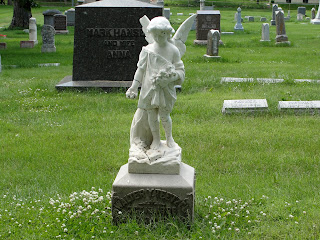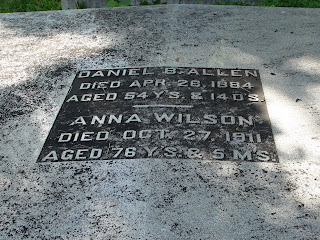One place we visited was Prospect Hill Cemetery on 32nd and Parker. Our tour guide was Burke history teacher Bill Deardoff, and he shared some fantastic stories about people here in Omaha's oldest graveyard.
Prospect Hill began in 1858, and many of the prominent leaders of Omaha in its pioneer days are buried here. (And as Deardoff cheerfully noted - many of them were as crooked as they come!) A caretaker's house sits at the entrance. The cemetery is open daily, with a special celebration held on Memorial Day each year.
Some of the stories from the cemetery are sad. Small statues of lambs mark the graves of children who died in infancy. They are weathered now, but the sight of these two lambs together still makes me feel for the family who suffered such a loss.
Children who were older when they died - but still far too young - are watched over by angels.
But a few of those young people earned their place in the cemetery by acting with a lot of enthusiasm and not a lot of wisdom. The monument below is a memorial to four boys who were just looking for a good time. They had a gun and wanted to do some shooting, so they headed down by the railroad tracks where there wouldn't be a lot of people around. (So far, so good - right?) They set up their bottles on an old shed and fired away. Unfortunately, they used the shed that the railroad stored their explosives in. Suffice it to say...they went out with a bang.
There was no way to separate or identify the remains, so they were buried together. It looks like the monument has been vandalized, but the pillars were actually meant to differ in height to represent the boys.
When I saw the grave below, I wondered how a man and a woman with different last names came to share a burial plot. As it turns out, Dan Allen and Anna Wilson were two of early Omaha's most colorful characters.
Dan was a gambler who arrived in Omaha by river boat. When he got here, he found that Omaha had plenty of gambling establishments, but they were mostly rigged. Dan carved out a niche for himself by setting up a higher class establishment where people might actually win money once in awhile - and make it out the door safely with their earnings. His place was located on the second floor of a building over a pawn shop, and our tour guide credited him with inventing the first ATM machine.
There was a dumb waiter that ran from the gambling hall down to the pawn shop. If someone was losing at cards, they could lower their watch down on the dumb waiter. Up would come a pawn ticket and some money. If they happened to win, they could lower the money (with interest) and their pawn ticket back down and reclaim their watch. How's that for pioneering spirit?
Anna Wilson was a "ruined woman" when she arrived in Omaha. But in the climate of the city, she kind of felt at home. She set up a large, upscale house of "friendly women." Business was booming, and when the movers and shakers came in for their entertainment, they also liked to brag about their business exploits. Anna listened in and started buying real estate out from under them. She may have been ruined, but she was nobody's fool.
Somehow, Dan and Anna met and fell in love. Anna continued to run her business but didn't practice the profession herself anymore. They wanted to marry, but given their backgrounds and professions, no church in town would do the honors. They lived together but never had children. And when Dan died, Anna had him buried at Prospect Hill and erected this monument to him.
Anna brought fresh flowers to his grave throughout the year. She eventually got out of her business altogether and donated the mansion for use as a hospital. (The city gladly accepted - after she had the anatomically correct female statues taken out and replaced by traditional wooden columns.) She gave many other contributions to people in need during her lifetime, and she bequeathed her entire fortune to hospitals, charities, and the city.
Before she died, Anna made arrangements to be buried next to Dan. And just to make sure they didn't dig her up and move her somewhere else, she had them pour a slab of concrete five feet thick on top of their graves! She had a shady past, but in the end, it was her charity that people remembered most. One family began leaving flowers at her grave every Memorial Day, and the tradition is carried on now during the annual Memorial Day celebration at the cemetery.
Andrew Poppleton was another colorful character in our history. He was a ringleader in helping to rig the vote more than once so Omaha could remain the site of the territorial capital. But he was also a lawyer who represented Standing Bear, the Ponca chief, in his trial at Fort Omaha. As a result of that trial, Native Americans were recognized as human beings with rights as citizens for the first time.
Prospect Hill has become the final resting place for soldiers from every American war since the War of 1812. (Don't feel bad if you missed that one in history class. It was a short conflict with the British in which very little happened - except for the writing of our national anthem.) You might see a star with the inscription "GAR" near some tombstones. These soldiers fought in the Grand Army of the Republic - the Union Army - during the Civil War. The first picture shows a replica from the caretaker's house close up. The s second shows an actual star near a headstone.
If you're interested in learning more about the residents of Prospect Hill, the caretaker's house has several pamphlets with information. I'm also curious to read A Dirty, Wicked Town: Tales of 19th Century Omaha. I'm afraid it won't paint a very glowing picture of our town's history, but it probably won't be dull, either!
I like the moral Bill Deardoff drew from the story of Dan Allen and Anna Wilson: Making mistakes in the past doesn't have to be the only thing you're remembered for. Let's hope that's true of both cities and people.










You captured the spirit of the cemetery. They should give the public tours of this place.
ReplyDelete